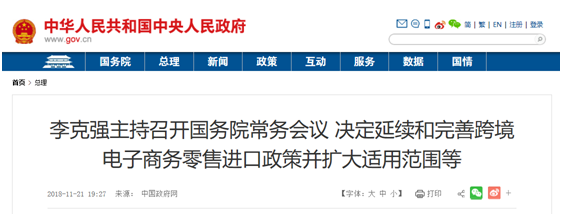
On November 21st, 2018, Premier Li Keqiang held an executive meeting of the state council, and decided to continue and improve the cross-border e-commerce (CBEC) retail import policy and expand the scope of application, so as to better stimulate the consumption potential and improve the quality and efficiency of the national economy. The policies decided on the meeting will be implemented on January 1st, 2019. In a word, the grace period of CBEC will continue since 2019, and for the moment, no one knows when the grace period will end.
Longer Positive List, no registration/filing required
It is decided on the meeting that 63 commodities in high demand will present on the list. Meanwhile, registration/filing and first-import permitted license will not be required for CBEC retail imported commodities, but they will be supervised as personal imported items.
More cities, higher transaction limits
Otherwise, the meeting decided to expand the scope of cities for establishing CBEC pilot zones, increasing the total number from 13 to 35 cities (refer to table 1 for specific information). Moreover, the single transaction limit and annual transaction limit will be increased from RMB 2,000 and RMB 20,000 to RMB 5,000 and RMB 26,000, respectively.
Table 1 Cities approved to establish CBEC pilot zone in China
Approval time | New Approval cities |
March 12th, 2015 | Hangzhou |
January 12th, 2016 | Tianjin, Shanghai, Chongqing, Hefei, Zhengzhou, Guangzhou, Chengdu, Dalian, Ningbo, Qingdao, Shenzhen and Suzhou |
July 24th, 2018 | Beijing, Hohhot, Shenyang, Changchun, Harbin, Nanjing, Nanchang, Wuhan, Changsha, Nanning, Haikou, Guiyang, Kunming, Xi 'an, Lanzhou, Xiamen, Tangshan, Wuxi, Weihai, Zhuhai, Dongguan, Yiwu |
Since April 8th, 2016, CBEC policies have been adjusted for many times, and the main change process is shown in table 2.
Table 2 Main changes of CBEC policies in China
Time | Adjusted matters |
April 8th, 2016 |
|
May 24th, 2016 |
|
November 15th, 2016 |
|
March 17th, 2017 |
|
September 20th, 2017 |
|
December 7th, 2017 |
|
At the end of the transition period, the great news were finally published on the executive meeting of the state council, showing the determination to promote and improve international trade in the nation.
Reference

